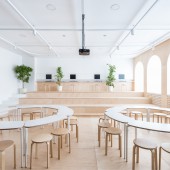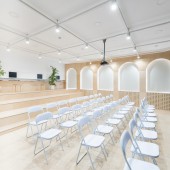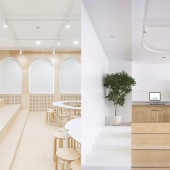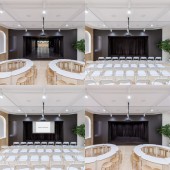Demokratos School Hall by Galina Milkova and Nedko Nikolov |
Home > Winners > #62854 |
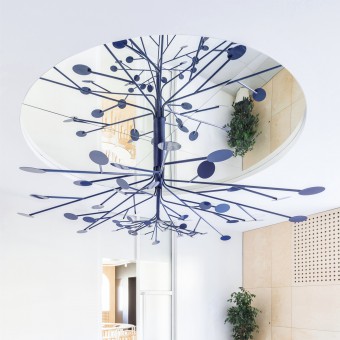 |
|
||||
| DESIGN DETAILS | |||||
| DESIGN NAME: Demokratos PRIMARY FUNCTION: School Hall INSPIRATION: The democratic world needs schools that foster independence, curiosity, and respect for the children’s personality. In democratic schools, children from an early age learn how to make decisions by creating their own curriculum. The school community also acts as a democratic structure in which teachers, pupils, and parents have the right to vote. The ultimate goal of democratic education is to equip these young people with the tools necessary to realize their dreams in the spirit of universal values. UNIQUE PROPERTIES / PROJECT DESCRIPTION: Demokratos is a project for renovating "St. St. Cyril and Methodius“ school hall in Sveti Vlas, Bulgaria, and transforming it into a democratic space within a traditional school. The new multifunctional hall embodies the principles of freedom, equality, and pluralism, typical of democratic education. The flexibility of the hall allows its transformation into a social hub, a debate hall, a theatre hall, a cinema, a presentation hall, a training center, a canteen. OPERATION / FLOW / INTERACTION: Due to the large area of the stage, a metal ceiling structure with a mobile curtain is created to control the depth of the stage depending on the performance. When the curtain is located at the beginning of the stage, it encloses a 45 sq.m. rehearsal room with a mirror wall. In the same position, the curtain provides a background for a multimedia screen in the auditorium. The auditorium has a free are that can be re-arranged in a seating area with 46 seats, a working area with mobile tables, a “roundtable” zone or a canteen. PROJECT DURATION AND LOCATION: The project started in December 2016, and finished in September 2017. The designing process included an extended research for 2 months, conceptual and technical drawings, supervision of the construction for four months. The construction took place in Sveti Vlas, Bulgaria. FITS BEST INTO CATEGORY: Interior Space and Exhibition Design |
PRODUCTION / REALIZATION TECHNOLOGY: The renovation of the existing hall includes the auditorium, the stage, and the lobby. The auditorium consists of a plywood amphitheatre, a computer centre for self-initiated knowledge with Khan Academy platform, and a free area. The latter can be re-arranged in a seating area with 46 seats, a working area with mobile tables, a “roundtable” zone or a canteen. The natural sunlight coming from the windows is controlled by two types of blinds combined in a common box. The semi-transparent roller blinds provide soft daylight and the blackout roller blinds block the light out when cinema projections, stage performances, or multimedia presentations are held. The eccentricity problem of the stage is resolved by separating visually the walking line and the stairs serving the amphitheatre. Thus, the center axis of the auditorium coincides with the axis of the stage. The two areas are separated by colour, but the physical boundary between them is mobile. Due to the large area of the stage, a metal ceiling structure with a mobile curtain is created to control the depth of the stage depending on the performance. When the curtain is located at the beginning of the stage, it encloses a 45 sq.m. rehearsal room with a mirror wall. In the same position, the curtain provides a background for a multimedia screen in the auditorium. The screen mechanism is hidden in the stage portal. The lighting in both the auditorium and the stage is designed to serve all possible functional scenarios. As far as the lobby of the hall is concerned, its main function as a lunch distribution and hygienic zone with two sinks is preserved. Three oak benches with different heights appropriate for children of all ages are positioned in the centre of the lobby. Above them, the artistic accent of the project hangs from a mirror ceiling. The hanging installation "Tree of non-knowledge" interprets Yaakov Hecht's idea of the universal knowledge outside the school curriculum, to which only curiosity may lead us. The school knowledge, represented by the tree branches, is accessible and handed to our children. However, instead of passive knowledge receivers, the educational system should create active searchers of hidden knowledge, represented by the invisible tree roots. The installation is a metaphoric message that Demokratos gives children all necessary attributes on their discovery journey. SPECIFICATIONS / TECHNICAL PROPERTIES: Demokratos occupy about 170 sq. m. It includes an auditorium, a stage, and the adjoining lobby. TAGS: school, democracy, social innovation, auditorium, stage, education, flexibility RESEARCH ABSTRACT: Creating a democratic space within a traditional school is an innovative process that required gathering information on traditional school problems and democratic school positives. In our research Finland modern school architecture, as well as Yaakov Hecht's book "Democratic Education" were essential. CHALLENGE: During the designing process, we tried to create a space that transmits democratic values and solve the existing architectural and functional problems, as well. Despite the fact that the hall is the largest functional area in the building plan, its use is sporadic and the access to it is limited and controlled by the school administration. An additional problem is the poor visibility of the stage caused by the flat floor of the auditorium. Also, the stage is positioned eccentrically towards the seating area. The stage depth is oversized and parts of it remain not visible from the side seats in the auditorium. All these problems are a consequence of the fact that the original function of the space was a canteen with a kitchen, later rebuilt in an event hall. The only reminiscence of the previous function is a room through which a packaged food is served in the lobby. ADDED DATE: 2017-12-29 15:58:30 TEAM MEMBERS (2) : Galina Milkova and Nedko Nikolov IMAGE CREDITS: Photography: Niki Dinov PATENTS/COPYRIGHTS: Copyrights belong to Think Forward, 2017. |
||||
| Visit the following page to learn more: http://thinkforwardlab.com/ | |||||
| AWARD DETAILS | |
 |
Demokratos School Hall by Galina Milkova and Nedko Nikolov is Winner in Interior Space and Exhibition Design Category, 2017 - 2018.· Press Members: Login or Register to request an exclusive interview with Galina Milkova and Nedko Nikolov. · Click here to register inorder to view the profile and other works by Galina Milkova and Nedko Nikolov. |
| SOCIAL |
| + Add to Likes / Favorites | Send to My Email | Comment | Testimonials | View Press-Release | Press Kit |

